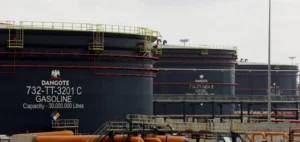Kazakhstan, whose economy heavily relies on the oil sector, is experiencing increasing difficulties due to delays in several large-scale projects. These setbacks directly affect its production targets and jeopardize its ability to meet OPEC+ quotas. In 2024, the national oil output is expected to reach approximately 98.2 million tonnes (MMt), representing only a 4.94% increase compared to the previous year, an insufficient pace to offset the losses incurred in 2023.
The situation is further complicated by scheduled maintenance at the Tengiz and Kashagan sites, two of the country’s largest fields. These operations, necessary to stabilize production, coincide with the country’s need to adjust its production to comply with OPEC+ quotas. This combination of factors could slow national economic growth, given that oil revenues account for 50% of total exports and nearly 30% of tax revenues.
Delays at the Tengiz Field
The Tengiz field, one of the country’s main producers, is experiencing significant delays in its expansion project, known as the Future Growth Project (FGP). Initially planned for 2024, the project’s full start-up has been pushed back to 2025, mainly due to disruptions related to the COVID-19 pandemic and the technical complexity of the development. The operation’s budget, originally estimated at $36.8 billion, has been revised upward to $47 billion.
The economic impact of this delay is substantial. If the FGP had adhered to its original schedule, Tengiz’s production would have enabled a 7.7% annual increase in national output, compared to only 4.94% projected for 2024. Tengiz’s delays also limit the country’s export capacity, as this field significantly supplies the CPC pipeline, a key route for crude oil exports to the Novorossiysk terminal in Russia.
Untapped Potential at the Kashagan Field
Kashagan, another strategic field for Kazakhstan, could offset Tengiz’s production losses. Currently, this field produces around 20 MMt annually, but expansion plans are underway to increase this volume to 22 MMt by 2026. Part of this growth depends on the commissioning of new gas processing plants, built in partnership with Qatar UCC Holdings. These facilities will enable greater gas processing capacity and, consequently, an increase in oil production.
However, the success of these projects largely hinges on resolving financial disputes between the consortium partners operating the field and the Kazakh government. If negotiations fail, further delays could jeopardize long-term production forecasts.
Consequences for Exports and the Economy
The cumulative delays at Tengiz and Kashagan have a direct impact on the volumes exported through the Caspian Pipeline Consortium (CPC). In 2023, the CPC transported 56.1 MMt of crude, representing 80.1% of Kazakhstan’s total output. Without a rapid increase in production, the CPC may not reach its full capacity, thus impacting the country’s export revenues.
OPEC+ is closely monitoring Kazakhstan’s ability to meet its commitments. The country had already exceeded its quotas in the first half of 2024, necessitating a reduction in production in the following months. This further complicates operational planning and could result in additional sanctions from the organization if the country continues to exceed its thresholds.
Growth Prospects for 2025
The outlook for 2025 remains uncertain. Current forecasts depend on the completion of the Tengiz projects and the expansion of Kashagan. However, technical uncertainties and financial disputes could still push these timelines further. If Kazakhstan manages to overcome these challenges, its production could return to a stable growth level, thereby strengthening its position in the global oil market.





















